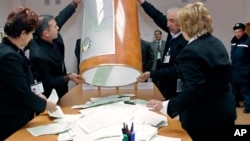The March 29th Uzbek presidential election was less than free and fair, according to the Organization for Security and Cooperation in Europe, or OSCE, observer mission. Longtime authoritarian leader Islam Karimov won a fourth consecutive term, garnering over 90 percent of the vote against three nominal rivals. According to Uzbekistan's election commission, there was 91 percent voter turnout.
The OSCE observer mission reported that the elections not only contravened the constitutional limit of two consecutive presidential terms, but were further marked by lack of genuine political alternatives, restrictions on freedoms of expression and association, and widespread legal and organizational shortcomings.
The 77-year-old Karimov has led the former Soviet republic in Central Asia since the late 1980s and has sought to neutralize all opposition to his rule. In 2005, the Uzbek government conducted a violent crackdown on demonstrators in the Ferghana Valley city of Andijan that is believed to have left more than a hundred dead.
Almost all Western media have been barred from reporting inside the country since that time, and independent Uzbek journalists and activists face sustained harassment.
The United States continues to firmly support the rights of all Uzbeks to take part in free, fair, and periodic elections marked by meaningful choice.
As such, said U.S. Ambassador to the U.S. Mission to the OSCE Daniel Baer, "We remain committed to pursuing democratic reforms and the protection of human rights in Uzbekistan, in support of economic development and regional stability. In the spirit of partnership with Uzbekistan, [the U.S.] encourage[s] the government to respond to the OSCE report and to fulfill its international obligations and OSCE commitments on democratic elections and civil and political rights."






